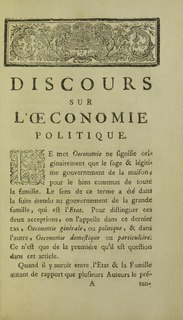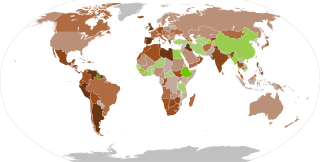National economy may refer to:
- Economy of a particular country
- The type of economy desired by economic nationalism
- National economy (Germany), theory developed by Friedrich List
- National economy (Turkey)
National economy may refer to:
Capital most commonly refers to:
Defense or defence may refer to:

Political economy is the study of production and trade and their relations with law, custom and government; and with the distribution of national income and wealth. As a discipline, political economy originated in moral philosophy, in the 18th century, to explore the administration of states' wealth, with "political" signifying the Greek word polity and "economy" signifying the Greek word οἰκονομία. The earliest works of political economy are usually attributed to the British scholars Adam Smith, Thomas Malthus, and David Ricardo, although they were preceded by the work of the French physiocrats, such as François Quesnay (1694–1774) and Anne-Robert-Jacques Turgot (1727–1781).

A developed country, industrialized country, more developed country (MDC), or more economically developed country (MEDC), is a sovereign state that has a developed economy and advanced technological infrastructure relative to other less industrialized nations. Most commonly, the criteria for evaluating the degree of economic development are gross domestic product (GDP), gross national product (GNP), the per capita income, level of industrialization, amount of widespread infrastructure and general standard of living. Which criteria are to be used and which countries can be classified as being developed are subjects of debate.
Depression may refer to:
Industry may refer to:
Fuel economy may refer to:
A ministry of finance is a common type of government department that serves as a finance ministry.
Economy of Ireland may refer to:
Digital usually refers to something using digits, particularly binary digits.
A Commerce minister is a position in many governments that is responsible for regulating external trade and promoting economic growth. In many countries, this role is separate from a finance minister, who has more budgetary responsibilities.
Five-year plan may refer to:
Inequality may refer to:
An economy is an area of the production, distribution and trade, as well as consumption of goods and services by different agents. In general, it is defined 'as a social domain that emphasize the practices, discourses, and material expressions associated with the production, use, and management of resources'. A given economy is the result of a set of processes that involves its culture, values, education, technological evolution, history, social organization, political structure and legal systems, as well as its geography, natural resource endowment, and ecology, as main factors. These factors give context, content, and set the conditions and parameters in which an economy functions. In other words, the economic domain is a social domain of interrelated human practices and transactions that does not stand alone.

A black market, underground economy or shadow economy, is a clandestine market or series of transactions that has some aspect of illegality or is characterized by some form of noncompliant behavior with an institutional set of rules. If the rule defines the set of goods and services whose production and distribution is prohibited by law, non-compliance with the rule constitutes a black market trade since the transaction itself is illegal. Parties engaging in the production or distribution of prohibited goods and services are members of the illegal economy. Examples include the drug trade, prostitution, illegal currency transactions and human trafficking. Violations of the tax code involving income tax evasion constitute membership in the unreported economy.

The Great Depression was a severe worldwide economic depression that took place mostly during the 1930s, beginning in the United States. The timing of the Great Depression varied across the world; in most countries, it started in 1929 and lasted until the late 1930s. It was the longest, deepest, and most widespread depression of the 20th century. The Great Depression is commonly used as an example of how intensely the global economy can decline.
Market may refer to:

The economic impact of the 2020 coronavirus pandemic in India has been largely disruptive. India's growth in the fourth quarter of the fiscal year 2020 went down to 3.1% according to the Ministry of Statistics. The Chief Economic Adviser to the Government of India said that this drop is mainly due to the coronavirus pandemic effect on the Indian economy. Notably India had also been witnessing a pre-pandemic slowdown, and according to the World Bank, the current pandemic has "magnified pre-existing risks to India's economic outlook".